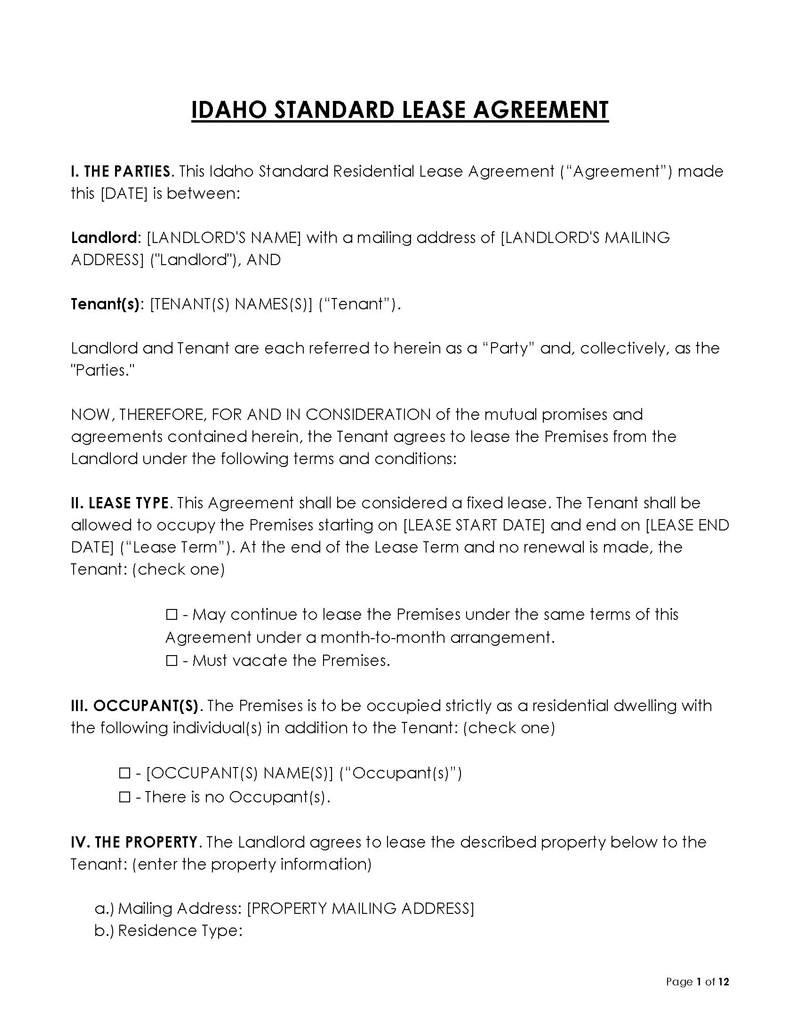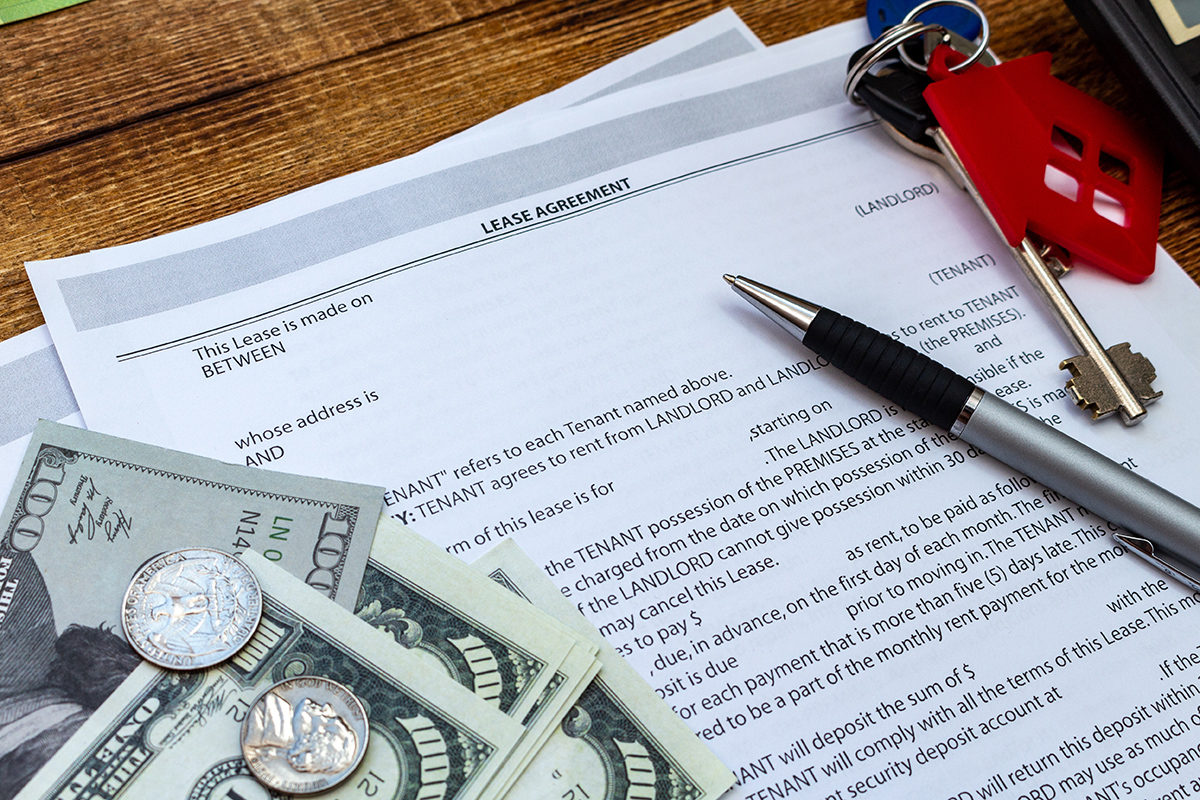When it comes to preparing a lease agreement, landlords in different states are expected to observe the Federal laws of their particular state regarding renting. However, in the case of the lease agreement in Idaho, the landlords are expected to include specific details in their agreements to make them complete and adequate.
This information includes details of the landlord and tenant such as name and addresses, the address and location of the leased property or premises, information on whether pets are allowed or not, any health hazards or risks within the property, and the rent specification, such as the amount of rent, security deposit, payments dates, and payment methods.
With this article, landlords and tenants from Idaho state can quickly learn the types, required disclosures, and information in the lease agreement.
Idaho Lease Agreement
A lease agreement in Idaho is an official document that acts as a contract between a landlord and the tenant.
The agreement enables the landlord to rent out their property to a specific tenant in exchange for rent. Before the agreement is prepared, landlords in Idaho must first review the tenant by looking at their credentials in the rental application. Next, a tenant prepares a rental application to enable the landlord to review if the tenant is financially capable of renting out the property.
During the verification process, the tenant will be required to pay a fee and sign the approved lease agreement between them and the landlord. After this agreement is signed in Idaho, landlords must receive the first month’s payment before allowing the tenant to move into the property.
In Idaho, two laws must be observed when preparing the lease agreement:
- For commercial property– Title 28, Chapter 12
- For residential property– Title 6, Chapter 3
Types of Lease Agreement
There are different types of lease agreements in Idaho that a landlord can prepare. It all depends on the situation and the needs of the tenant.
Some of these types of lease agreements in Idaho include the following:
- For commercial property– Title 28, Chapter 12
- For residential property– Title 6, Chapter 3
There are different types of lease agreements in Idaho that a landlord can prepare. It all depends on the situation and the need of the tenant.
Some of these types of lease agreements in Idaho include the following:
Commercial lease agreement
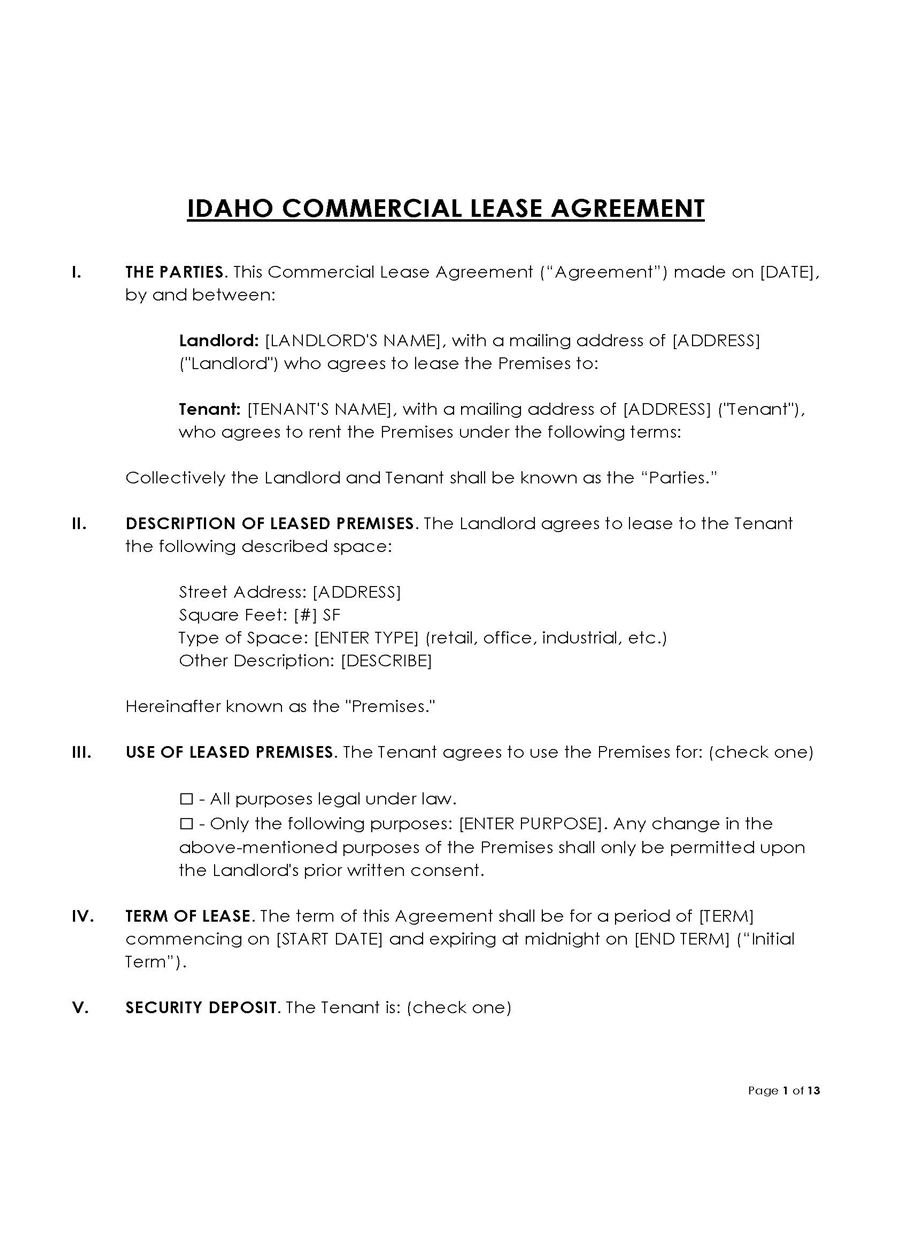
This agreement is meant for a property or premise being rented for business in Idaho. This can include leasing storefronts, office space, and warehouses. This type of lease agreement in Idaho should have details of rent, security deposit, the lease term, exclusivity, and even subleasing.
Month-to-month lease agreement
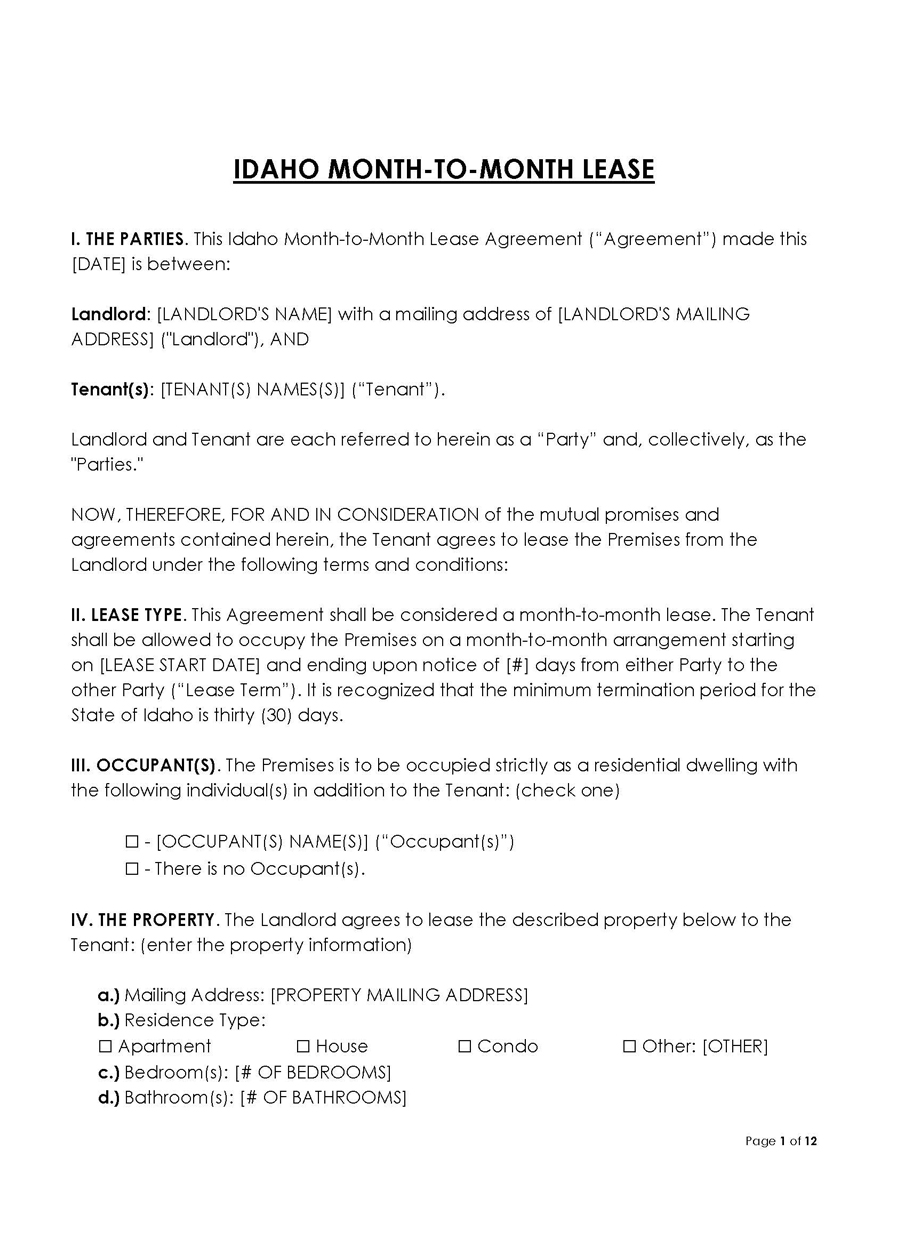
This lease agreement in Idaho is a tenancy at will and is a short-term contract that can be terminated by either the landlord or tenant according to § 55-208. The lease has no exact end date, and the tenant is allowed to rent the property while paying for rent every month. For termination of this lease agreement, the party involved should provide 30 days or one month’s notice.
Rent-to-own lease agreement
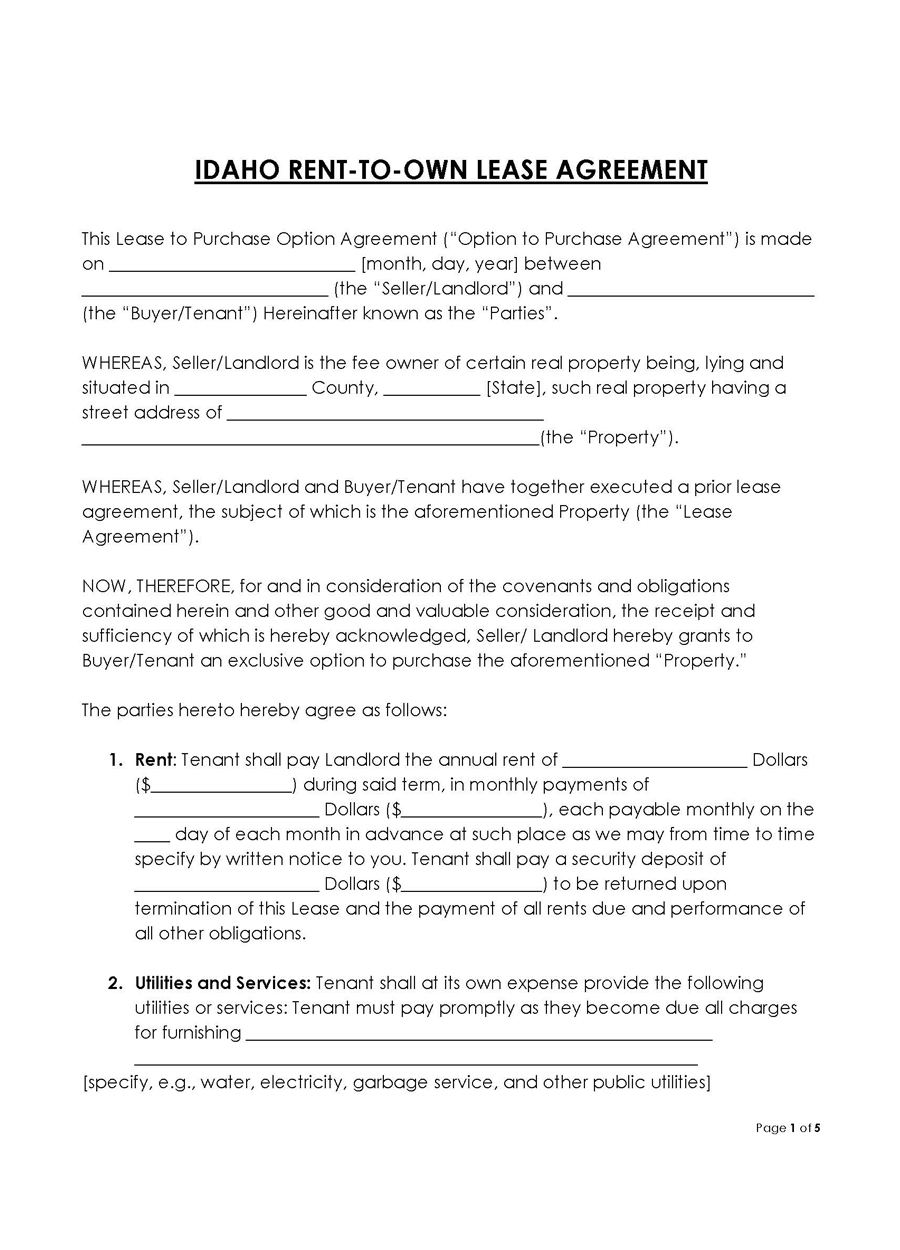
This agreement is a contract that has an additional provision that allows a tenant (buyer) to purchase the leased property from the landlord (seller). As a landlord, before making this agreement, ensure that you screen your tenant and discuss the purchase options with them before signing the lease agreement.
Roommate lease agreement
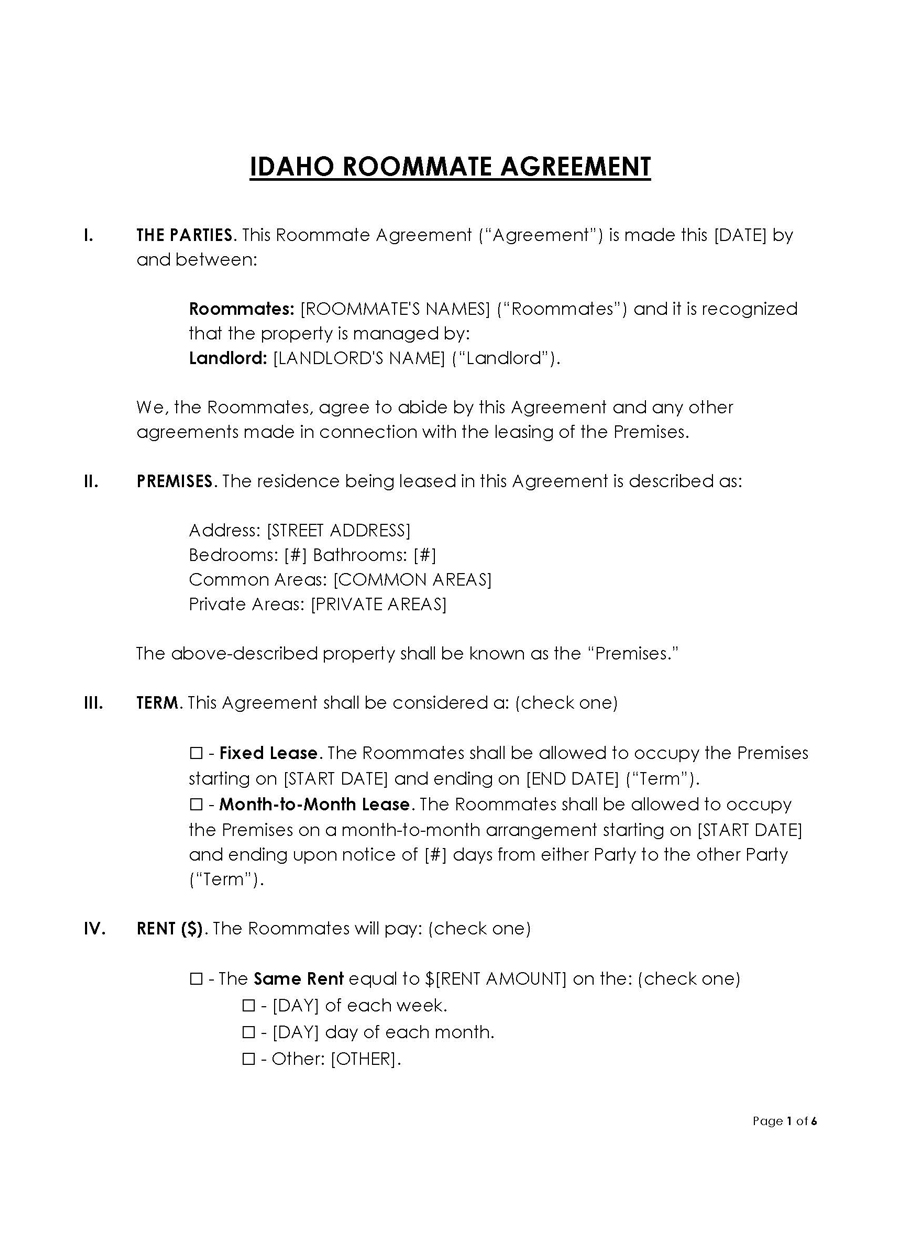
A roommate lease agreement or a room rental agreement is a contract between house members who share a common living space. In Idaho, this lease agreement is different because the agreement is not made between a tenant and the landlord or agent of the rented property. With this contract, members of a shared housing can lay out proper regulations for better co-existence as roommates.
Standard lease agreement
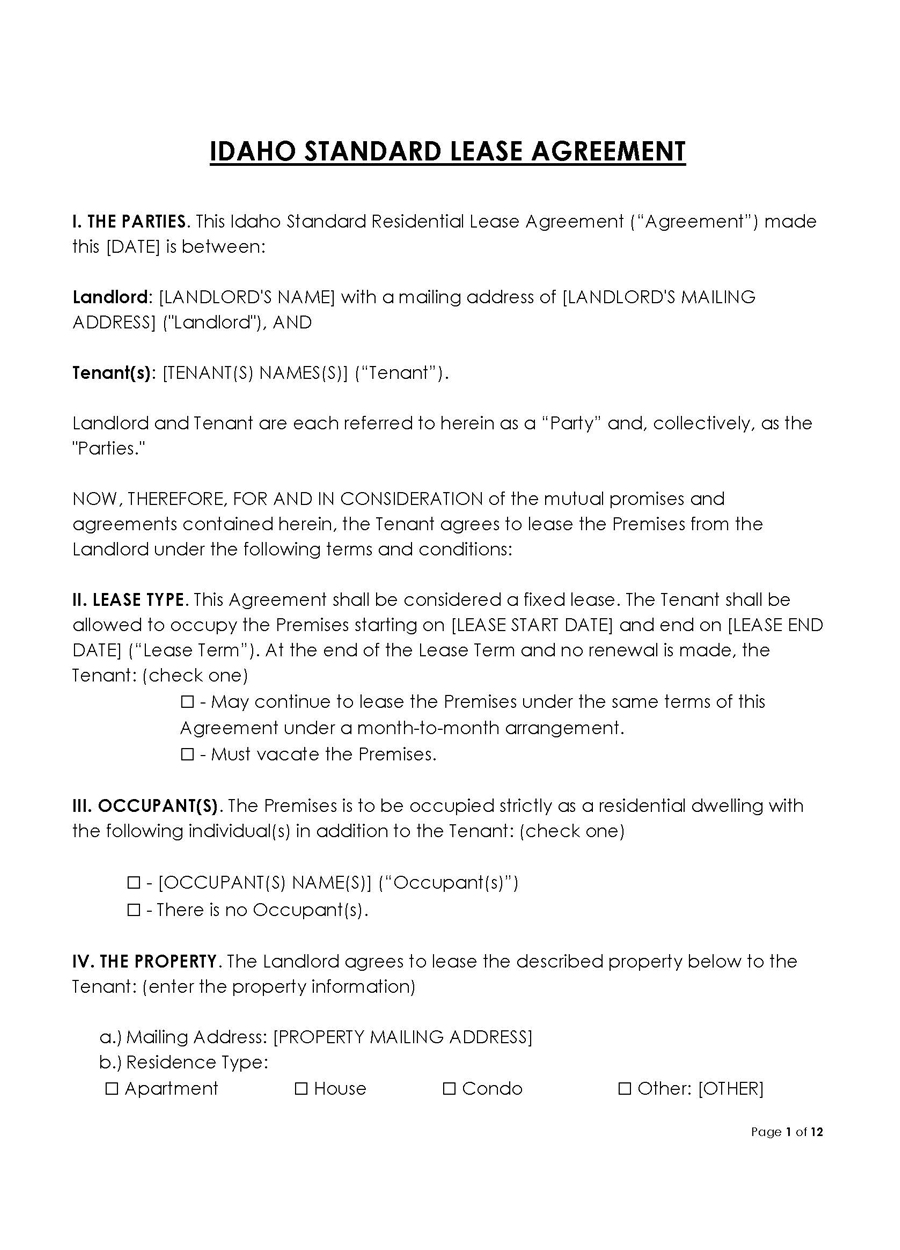
It is a fixed rental contract, usually for one year or 12 months, between a tenant and a landlord with conditions like the number of people allowed in the rented space, rent, the required security deposit, and any other security pet rules. In some cases, the fixed amount of time might vary.
Sublease agreement
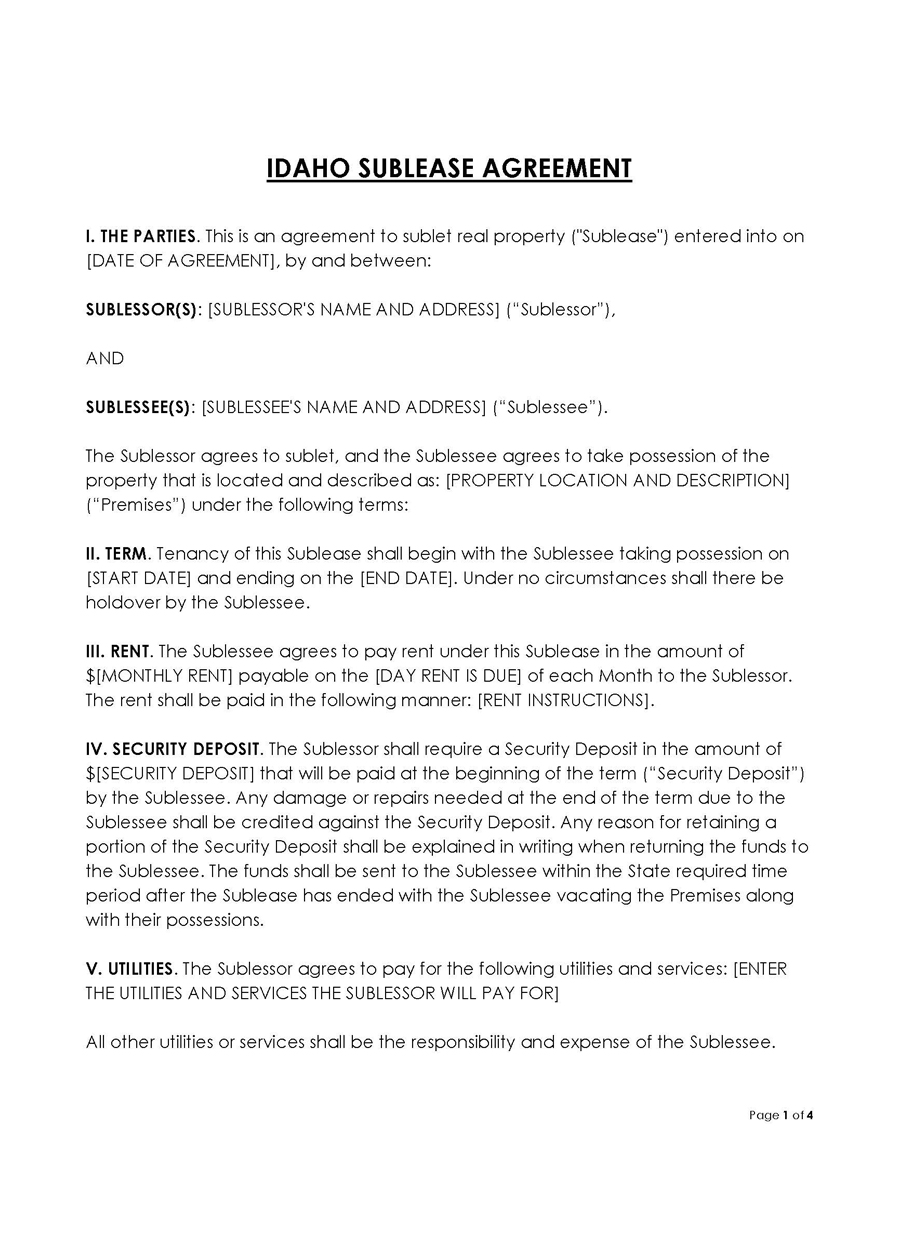
A sublease agreement in Idaho is a contract prepared by a tenant who wants to sublease their rented residential property for a while. This contract is between a tenant and sub-lessee, which lasts when the current tenant agrees with the landlord. As a tenant, you need to first seek permission from the landlord before making this agreement.
Disclosures Required in Idaho Lease Agreement
When preparing the lease agreement in Idaho, a landlord must include disclosures about the rental property in the agreement according to Idaho’s State laws. With these disclosures, the landlord reduces the chances of tenant conflicts and legal liabilities.
The types of disclosures required in this lease agreement include the following:
Lead-based paint
This lead-based paint disclosure must be included for all rental properties built before 1978. It aims to inform any interested tenants about the risks of lead-based paints. As the landlord, you will have to fill in a lead-based paint disclosure form and attach it to the lease agreement. You should also provide the tenant with an Environmental Protection Agency (EPA) approved pamphlet to warn them about the hazards and risks of lead-based paint.
Landlord name and address
Idaho landlords must include their names and addresses in the lease agreement for more accessible communication with their tenants. Such contact information is vital for notices and demands between both parties. In addition, if there is an agent responsible for the rental property, their contact information can be included in the agreement to make it easier for tenants to reach out.
Move-in checklist
The move-in checklist disclosure is required so that tenants are aware of the property damages present before they move into the rental property. This means that tenants can determine if they will still rent out the property and are also aware of their responsibility in case of any damages during the renting period. You can choose to include this information in the Idaho lease agreement or prepare a separate document for it.
Marijuana use
As the landlord in Idaho, you will need to disclose whether or not you allow marijuana use within your rental property in your lease agreement. For Idaho laws, landlords can restrict marijuana use completely, control where the marijuana users smoke, or even limit marijuana use to non-smoking techniques. This way, all tenants can co-exist peacefully with each other.
Late and returned check fees
The late and returned check fees disclosure in the lease agreement in Idaho is meant to inform the tenants of any late fees or bounced checks that they incur if their rent payment is late. The fees you can charge as a landlord are not limited but are usually 10% of the rent or an amount that covers any expenses you incurred due to the late payment. Keep in mind that these late fees only apply if the tenant has not paid their rent and the due date indicated in the agreement has passed.
Shared utilities
The landlord must specify which utilities, usually a utility metre for water or electricity, are shared for shared utility disclosure and how each tenant will be billed. This will help tenants know the number of utility bills they need to pay each month. The shared utility bills must be reasonable to each tenant to avoid issues.
Bed bug disclosure
Rental units must have a bed bug disclosure, especially if they have a history of bed bug infestation. With this information in the lease agreement , the tenants will know the protocol they need to follow in case of a bed bug infestation. In addition, the tenants will also be aware of what they need to do to prevent a bed bug infestation and how to immediately report any sign of bed bugs in the rental property.
Asbestos disclosure
As a landlord, the asbestos disclosure is required for you to notify your tenants about the presence of asbestos in the building for rental properties built before 1981. This way, the tenants can quickly inform you of any ceiling or wall deterioration and always take precautions against disturbing the asbestos fibers. Also, this means that your tenants will not sand, pound, modify and make any repairs without your consent to avoid asbestos poisoning.
Mold disclosure
The mold disclosure is essential and must be included in the agreement to inform the tenants of the mold status in your rental property. The tenants will be aware of mold and understand what they need to do to prevent further mold growth. This will help you avoid any future liability resulting from mold damages.
Landlord and Tenant Laws
There are landlord and tenant laws that you must comply with when preparing the lease agreement in Idaho.
These laws are as follows:
Relevant law
In Idaho, the relevant law regarding the lease agreement is found in Idaho Statutes Title 55.
Security deposit
There is no statute in Idaho State for the security deposit that mentions the amount of security deposit required for rental properties. Instead, landlords can request their tenants to pay a set amount as a security deposit. This information must be included in the lease agreement.
Also, landlords can either provide a specific period or not when returning the security deposit to the tenant. According to § 6-321, the time is usually 30 days after the end of the lease. However, suppose the period is not specified in the lease agreement. This means that an Idaho landlord must return the security deposit to the tenant within 21 days after the lease has ended.
Access
No Idaho State law defines the type of notice period that a landlord must give their tenant before gaining access to their rental premises. However, Idaho landlords are advised to provide advanced notice to have a proper and respectful relationship with the tenants. In addition, the landlord should inform the tenant if they wish to visit the property for repairs, maintenance, and other issues.
In Idaho State, landlords must screen their tenants and prepare a lease agreement for them to sign before renting out their premises. This allows landlords to get into legally binding contracts to lease their residential or commercial property in exchange for money. In addition, with this Idaho lease agreement, the landlord can easily include all the information that the tenant must know when renting their property.
Such details include rent, security deposit, payment methods, and even required fees in case of late payment. It is beneficial to have a lease agreement in Idaho to protect landlords from future legal issues and tenant conflicts. As a landlord or tenant, ensure you choose the suitable agreement according to your rental situation. You can review the free downloadable Idaho lease agreement samples to understand what you need when preparing and signing this agreement in Idaho.
Idaho Lease Agreement
Final Remarks
In Idaho State, landlords must screen their tenants and prepare a lease agreement for them to sign before renting out their premises. This allows landlords to get into legally binding contracts to lease their residential or commercial property in exchange for money. In addition, with this Idaho lease agreement, the landlord can easily include all the information that the tenant must know when renting their property.
Such details include rent, security deposit, payment methods, and even required fees in case of late payment. It is beneficial to have a lease agreement in Idaho to protect landlords from future legal issues and tenant conflicts. As a landlord or tenant, ensure you choose the suitable agreement according to your rental situation. You can review the free downloadable Idaho lease agreement samples to understand what you need when preparing and signing this agreement in Idaho.
